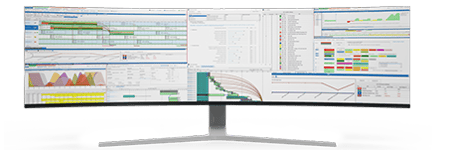Enriching Demand Forecasting and Capacity Planning
As an Operations Director in a packaging manufacturing facility, your role is integral to balancing production efficiency with demand, ensuring that the right products are ready at the right time without excess waste or delay. Demand forecasting and capacity planning are essential to maintaining this balance. However, traditional forecasting and planning methods often struggle to keep up with the dynamic nature of customer demands, especially in a competitive market that demands agility and responsiveness.
Fortunately, the integration of advanced systems like PlanetTogether with robust enterprise solutions such as SAP, Oracle, Microsoft, Kinaxis, or Aveva can provide a transformative approach. Through real-time data access, enhanced visibility, and seamless automation, these integrated systems enable your facility to forecast demand accurately, optimize capacity, and make agile, data-driven decisions to stay ahead of the curve.

The Critical Link Between Demand Forecasting and Capacity Planning
Demand forecasting and capacity planning are interconnected processes that, when optimized, help packaging manufacturers achieve both efficiency and resilience. Demand forecasting uses historical data, market analysis, and predictive analytics to estimate future product demand. Accurate forecasts allow production teams to set realistic goals, prevent stockouts or overproduction, and better allocate resources.
Capacity planning, on the other hand, ensures that the facility has the necessary resources—equipment, labor, materials—to meet forecasted demand. By proactively adjusting capacity based on anticipated demand fluctuations, your facility can minimize downtime, reduce lead times, and maximize output.
When demand forecasting and capacity planning are aligned, they offer a powerful operational advantage. However, without integrated systems to provide real-time visibility and data-driven insights, even the best strategies can fall short of meeting production goals. This is where integrating PlanetTogether with ERP or supply chain management systems like SAP, Oracle, Microsoft, Kinaxis, or Aveva can make a significant difference.


Benefits of Integrating PlanetTogether with Leading ERP Systems for Demand Forecasting and Capacity Planning
By integrating PlanetTogether with a leading ERP system, packaging manufacturers gain the following critical benefits:
Improved Forecast Accuracy through Real-Time Data Aggregation
PlanetTogether’s integration with systems like SAP or Oracle allows for seamless data sharing, ensuring that forecasts are based on real-time, comprehensive data rather than static historical data alone. By accessing up-to-date sales, inventory, and production data, the forecasting models can better account for shifts in customer demand and market trends. This improvement leads to more precise forecasts, helping your team make proactive decisions and mitigate potential production issues before they arise.
Enhanced Capacity Utilization and Flexibility
Integrated systems enable real-time capacity tracking, making it easier to adjust production schedules as demand changes. For example, if a sudden spike in demand is forecasted, an integrated PlanetTogether and ERP system can quickly assess current capacity, inventory levels, and labor availability. This rapid response allows the facility to ramp up production as needed without jeopardizing efficiency or quality, enhancing your ability to capitalize on unexpected demand surges and minimize missed opportunities.
Optimized Production Scheduling and Resource Allocation
PlanetTogether’s integration provides advanced scheduling tools that work in tandem with ERP data. For instance, by linking PlanetTogether with Microsoft or Kinaxis, you gain insight into how available resources, from machines to labor, can be optimally scheduled based on forecasted demand. This collaboration reduces idle time, prevents bottlenecks, and allows for more flexible scheduling adjustments in real-time. With better visibility into resource utilization, operations managers can adjust shift patterns, manage labor allocation, and prevent resource underutilization or overloading.
Reduction in Lead Times and Improved Delivery Performance
Short lead times are essential in packaging manufacturing, where customers expect swift fulfillment. With an integrated system, forecast accuracy improves, enabling you to plan more precisely and fulfill orders faster. For instance, the integration between PlanetTogether and SAP or Oracle can enable automated adjustments to production schedules, reducing the manual workload on planners and speeding up response times. As a result, your facility can improve on-time delivery performance and enhance customer satisfaction.
Greater Control over Inventory Levels
Inventory optimization is critical in packaging manufacturing, where stockouts can lead to missed deadlines, and excess inventory can mean unnecessary storage costs. An integrated PlanetTogether and ERP system allows your team to align inventory levels with demand forecasts, ensuring that stock levels are neither too low nor too high. For example, if demand forecasts indicate a downturn, the system can adjust production plans and reduce raw material orders to avoid excess inventory, helping control costs and maintain a lean inventory.

Strategic Benefits of Integrated Demand Forecasting and Capacity Planning for Operations Directors
Increased Agility in Meeting Market Demands
An integrated forecasting and planning system enables your facility to be more responsive to market changes. With accurate demand forecasts, operations can be fine-tuned to adapt to fluctuations quickly, giving your facility the agility needed to outpace competitors and retain customer loyalty.
Reduced Waste and Improved Sustainability
By aligning production with demand, your facility can reduce overproduction, which in turn minimizes waste and resource consumption. This benefit not only saves costs but also supports sustainability initiatives by reducing the environmental impact of your operations—an increasingly critical factor in today’s manufacturing landscape.
Enhanced Collaboration Across Departments
The integration fosters collaboration between sales, production, and supply chain teams by providing a unified view of demand and capacity metrics. This transparency helps departments work together to achieve shared objectives, reduce miscommunication, and ensure that every team is aligned toward meeting production goals.
Data-Driven Decision Making
Integrated systems empower your team with data-driven insights, enabling faster, more accurate decisions. The visibility into production performance and demand metrics allows managers to make adjustments with confidence, knowing that their choices are based on real-time data. This capability is crucial in a competitive market where proactive decision-making can be the difference between success and missed opportunities.
Demand forecasting and capacity planning are no longer just operational functions; they are strategic processes that drive efficiency, agility, and profitability. As an Operations Director, leveraging the power of an integrated PlanetTogether and ERP system—whether SAP, Oracle, Microsoft, Kinaxis, or Aveva—can help you transform these processes and achieve superior results.
By providing real-time visibility, advanced scheduling, and enhanced data-driven insights, these integrated systems enable your facility to optimize production, reduce costs, and improve customer satisfaction.
In today’s market, adopting this integrated approach to demand forecasting and capacity planning is essential for staying competitive and achieving operational excellence. Are you ready to take your manufacturing operations to the next level? Contact us today to learn more about how PlanetTogether can help you achieve your goals and drive success in your industry.























LEAVE A COMMENT